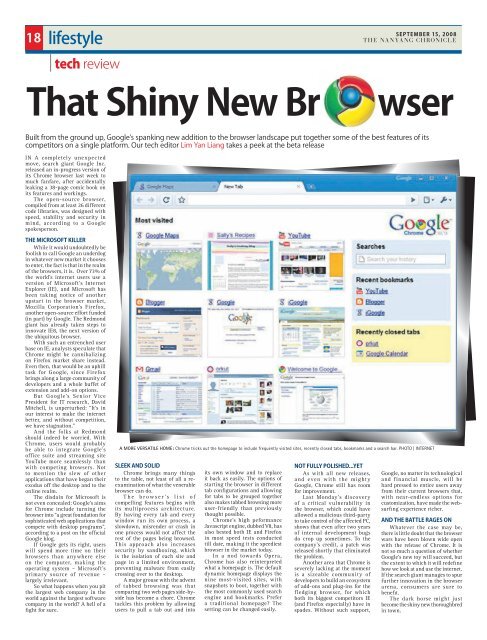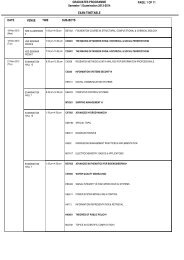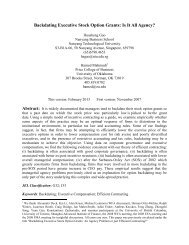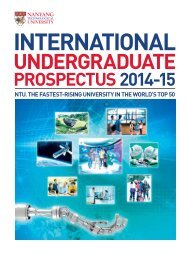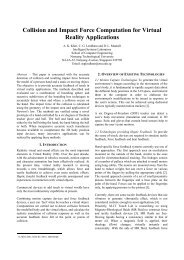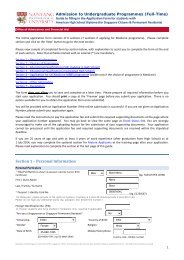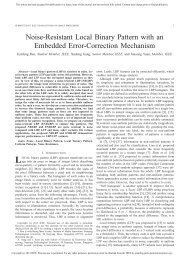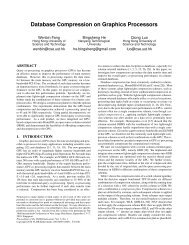THE NANYANG CHRONICLEIN A completely unexpectedmove, search giant Google Inc.released an in-progress version ofits Chrome browser last week tomuch fanfare, after accidentallyleaking a 38-page comic book onits features and workings.The open-source browser,compiled from at least 26 differentcode libraries, was designed withspeed, stability and security inmind, according to a Googlespokesperson.While it would undoubtedly befoolish to call Google an underdogin whatever new market it choosesto enter, the fact is that in the realmof the browsers, it is. Over 73% ofthe world’s internet users use aversion of Microsoft’s InternetExplorer (IE), and Microsoft hasbeen taking notice of anotherup<strong>star</strong>t in the browser market,Mozilla Corporation’s Firefox,another open-source ef<strong>for</strong>t funded(in part) by Google. The Redmondgiant has already taken steps toinnovate IE8, the next version ofthe ubiquitous browser.With such an entrenched userbase on IE, analysts speculate thatChrome might be cannibalizingon Firefox market share instead.Even then, that would be an uphilltask <strong>for</strong> Google, since Firefoxbrings along a large community ofdevelopers and a whole buffet ofextension and add-on options.But Google’s Senior VicePresident <strong>for</strong> IT research, DavidMitchell, is unperturbed: “It’s inour interest to make the internetbetter, and without competition,we have stagnation.”And the folks at Redmondshould indeed be worried. WithChrome, users would probablybe able to integrate Google’soffice suite and streaming siteYouTube more seamlessly thanwith competing browsers. Notto mention the slew of otherapplications that have began theirexodus off the desktop and to theonline realm.The disdain <strong>for</strong> Microsoft isnot even concealed: Google’s aims<strong>for</strong> Chrome include turning thebrowser into “a great foundation <strong>for</strong>sophisticated web applications thatcompete with desktop programs”,according to a post on the officialGoogle blog.If Google gets its right, userswill spend more time on theirbrowsers than anywhere elseon the computer, making theoperating system – Microsoft’sprimary source of revenue –largely irrelevant.So what happens when you pitthe largest web company in theworld against the largest softwarecompany in the world? A hell of afight <strong>for</strong> sure.A MORE VERSATILE HOME: Chrome tricks out the homepage to include frequently visited sites, recently closed tabs, bookmarks and a search bar. PHOTO | INTERNETChrome brings many thingsto the table, not least of all a reexaminationof what the venerablebrowser can do.The browser’s list ofcompelling features begins withits multiprocess architecture.By having every tab and everywindow run its own process, aslowdown, misrender or crash inone process would not affect therest of the pages being browsed.This approach also increasessecurity by sandboxing, whichis the isolation of each site andpage in a limited environment,preventing malware from easilycrossing over to the desktop.A major grouse with the adventof tabbed browsing was thatcomparing two web pages side-bysidehas become a chore. Chrometackles this problem by allowingusers to pull a tab out and intoits own window and to replaceit back as easily. The options of<strong>star</strong>ting the browser in differenttab configurations and allowing<strong>for</strong> tabs to be grouped togetheralso makes tabbed browsing moreuser-friendly than previouslythought possible.Chrome’s high pe<strong>for</strong>manceJavascript engine, dubbed V8, hasalso bested both IE and Firefoxin most speed tests conductedtill date, making it the speediestbrowser in the market today.In a nod towards Opera,Chrome has also reinterpretedwhat a homepage is. The defaultdynamic homepage displays thenine most-visited sites, withsnapshots to boot, together withthe most commonly used searchengine and bookmarks. Prefera traditional homepage? Thesetting can be changed easily.As with all new releases,and even with the mightyGoogle, Chrome still has room<strong>for</strong> improvement.Last Monday’s discoveryof a critical vulnerability inthe browser, which could haveallowed a malicious third-partyto take control of the affected PC,shows that even after two yearsof internal development bugsdo crop up sometimes. To thecompany’s credit, a patch wasreleased shortly that eliminatedthe problem.Another area that Chrome isseverely lacking at the momentis a sizeable community ofdevelopers to build an ecosystemof add-ons and plug-ins <strong>for</strong> thef ledging browser, <strong>for</strong> whichboth its biggest competitors IE(and Firefox especially) have inspades. Without such support,Google, no matter its technologicaland financial muscle, will behard pressed to entice users awayfrom their current browsers that,with near-endless options <strong>for</strong>customization, have made the websurfingexperience richer.Whatever the case may be,there is little doubt that the browserwars have been blown wide openwith the release of Chrome. It isnot so much a question of whetherGoogle’s new toy will succeed, butthe extent to which it will redefinehow we look at and use the internet.If the search giant manages to spurfurther innovation in the browserarena, consumers are sure tob e n e fi t .The dark horse might justbecome the shiny new thoroughbredin town.
THE NANYANG CHRONICLE PHOTO | INTERNETFOR a smartphone, the iPhone isprobably quite dumb by today'sstandards.It doesn't allow you to copy-andpastetext, <strong>for</strong>ward text messages,search through emails, recordvideo, share files via Bluetooth, sendmultimedia messages (MMS), editOffice documents, and the list goeson. It has no hardware keyboard,no removable battery, no way toexpand the memory, no support <strong>for</strong>Flash files and only a two megapixelcamera.Some of these deficienciesare <strong>star</strong>tling and enough reasonto keep some users away froman iPhone completely. But whywould thousands of others queue atSingTel's ComCentre on the midnightof August 22nd nevertheless, waitingsome three hours to get their handson the iPhone?There is no lack of reviews on theiPhone everywhere. Most of them,however, tend to focus on what theiPhone can or cannot do. But just likethe iPods, the iPhone really is aboutdoing things with style. Style is afterall the reason why iPods are the bestsellingportable music players arounddespite costing more and doing lessthan its competitors.In the case of the iPhone, styleis defined largely by an intuitiveand consistent interface: intuitivebecause you navigate it with thumbsand fingers on virtual buttons sizedcom<strong>for</strong>tably <strong>for</strong> use; consistentbecause the same swiping, pinchingand tapping finger gestures workthroughout the entire iPhoneoperating system and its third-partyapplications.Style is not about looks andfeel; it is really about how thingswork. Examining the oft-dubbed"iPhone killers" <strong>for</strong> instance—theSamsung Omnia and the HTCTouch Diamond—reveals that thereis no shortage of eye candies.Although both phones haveattempted to emulate the iPhoneby allowing users to scroll throughtheir custom interfaces with theswipe of a finger, such behaviouris not consistent throughout theentire phone.The problem arises when usersare thrown out of these custominterfaces, which are no more thanapplication launchers, into nativeWindows Mobile applications. Atwhich point, finger swiping nolonger works and buttons return totheir standard miniature sizes thatare more suited <strong>for</strong> the pin-pointprecision of a stylus than <strong>for</strong> usewith fingertips or thumbs.In contrast, because the iPhonewas designed from the <strong>star</strong>t to beused entirely with fingers andthumbs, every aspect of the itsinterface works well and naturallywithout the need <strong>for</strong> additionalinput devices (the Diamond includesa stylus and the Omnia an opticalmouse).Web surfing is probably thegreatest strength of the iPhone.Several of its features make surfingon it feasible and enjoyable: First,the bright, large and high-resolutionscreen displays text clearly andcrisply; second, the swiping andpinching finger gestures allow <strong>for</strong>quick and natural navigation ofwebpages; and third, the built-inmobile Safari browser displayswebpages quickly and accurately.The caveats are that theiPhone's browser cannot handleFlash (which locks you out of mostweb videos, as with the Omniaand the Diamond) and Java (usedmainly <strong>for</strong> internet banking andsome payment services).But <strong>for</strong> just about everythingelse the iPhone surfs the web as wellas a computer. You can access mostof the university's web services,such as StudentLink, Edventureand WebMail. Outside campus,having the internet available at yourfingertips everywhere can save youthe agony of wasting money on abad product or a lousy movie.A case in point: a day after Ibought the iPhone, I went shopping<strong>for</strong> a protective case. Unsure whichcase out of a dozen different brandswas better, I took out my iPhone,launched Safari, checked out thebest-rated case on ilounge.com,picked it up and went home a happycustomer.I am a self-confessed emailaddict. Most of the time though it isnot because I enjoy obsessing overthem, but because how quickly I amable to respond to some emails canmean whether a last-minute story iscovered in the Chronicle, or whetherthe editorial team gets to go home<strong>for</strong> dinner or supper on Friday ofproduction week.Setting up Gmail to work throughIMAP on the iPhone is a breeze. It isa shame though that the university'sweb mail server does not supportIMAP when NUS, SMU and othermajor universities do.No discussion of the iPhoneemailing capabilities is completewithout talking about the itstouchscreen-only keyboard. Cochiefexecutive Mike Lazaridis ofResearch in Motion, the companythat makes the BlackBerry, wasquoted April this year in The NewYork Times, saying: "I couldn’t typeon it and I still can’t type on it, and alot of my friends can’t type on it. It’shard to type on a piece of glass."Like Lazaridis, I thought I wouldhave hated the iPhone's keyboard.But I ended up liking it. Sure I makemistakes on it all the time, but theauto-correction technology worksso well that I can type close to 40words per minute on it using boththumbs now.Ironically, <strong>for</strong> the amount ofaversion the BlackBerry-makerhas towards the iPhone's keyboard,I found the lack of a real plastickeyboard a blessing in disguise.Because there’s no real buttons topress, typing requires minimalef<strong>for</strong>t and results in no sore thumbsafter typing a long email.Finding your way around thebuilt-in Google maps applicationwith the scrolling, pinching anddouble tapping gestures beatsflipping the street directory anyday. And when you do make a wrongturn somewhere and find yourselflost, the built-in GPS of the iPhone3G can locate you on the map most ofthe time in a matter of seconds, fromwhich you can have the iPhone plana route to your destination.Surprisingly Google maps canlocate precisely whatever addressyou throw at it, as long as a blocknumber and street name is included.Searching <strong>for</strong> companies andrestaurants is more of a hit-andmissaffair though since Googlemaps does not have a comprehensivedatabase of businesses in Singaporeyet.The iPhone, 3G or not, is farfrom perfect. Features-wise, the newiPhone continues to suffer from someserious omission of features, some ofthem so basic in handphones todaythat the question is inevitably raisedof why a state-of-the-art phone canbe so primitive in some areas.Per<strong>for</strong>mance-wise, the newiPhone 2.0 software no longer runsas smoothly and stably as its oldercounterpart. Some parts of the phonenow feel sluggish, particularlywhen searching through contacts.Some applications crash everynow and then, and the phone itselfhangs or re<strong>star</strong>ts randomly oncein a while (mine hung once andre<strong>star</strong>ted twice in the three weeksof extensive use).The iPhone 2.1 update releasedlast Friday promises to fix all these,but until more testing is done,it remains to be seen if all theproblems will be fully addressed.For a smartphone that does alot more, I have highlighted onlythree functions that the iPhone doesexceptionally well in. These alone,along with the phone features ofcourse, would have justified theprice of the iPhone <strong>for</strong> me.But <strong>for</strong> others, it could havebeen the iPod within—which I alsouse and like but did not write aboutin this article—having YouTube onthe go, or the many third-partyapplications that are available toinstall right on the iPhone.The iPhone is great <strong>for</strong> peoplewho are literally addicted to theinternet, want to get work done onthe go and appreciate good style.For me, the two-and-a-half hoursof travelling time daily can nowbe spent working on drafts <strong>for</strong>the Chronicle or just surfing theweb—that and listening to music.Even queueing <strong>for</strong> food in canteenB becomes bearable.But if you're one of those whoare even considering not takingup a data plan with your iPhone,you are better off spending yourmoney elsewhere—the iPhone isabout having the internet with youeverywhere.


